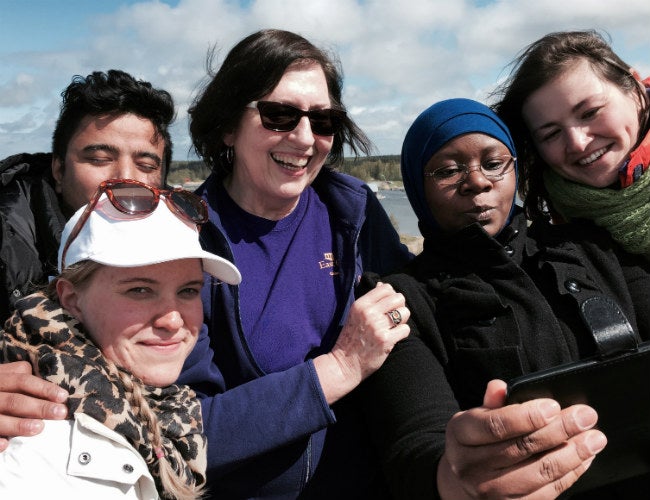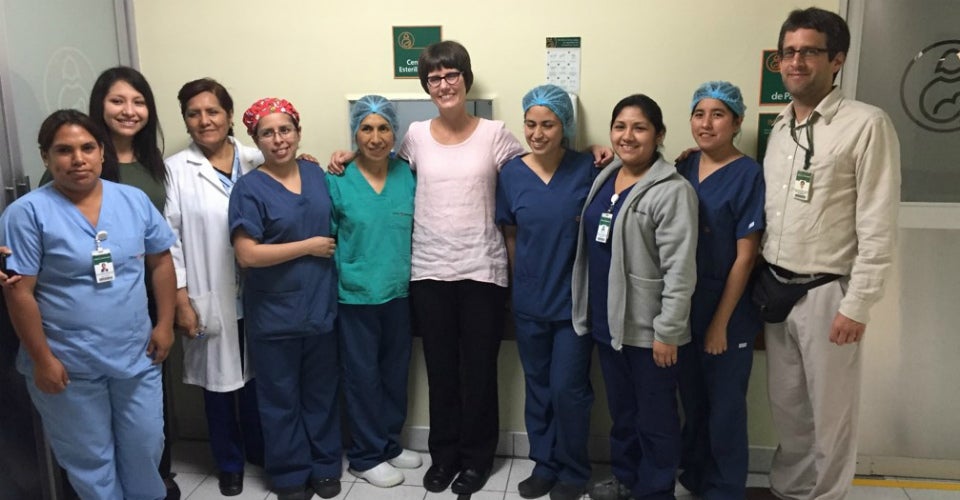NURSING WORLDWIDE
Global relationships extend College of Nursing around the world
It’s no secret that East Carolina University’s College of Nursing prepares nurses to serve North Carolina, educating the most new nurses of any institution in the state. And its graduate programs train students for a variety of advanced roles — graduates care for patients across the lifespan, from the tiniest babies as neonatal nurse practitioners to the elderly as adult-gerontology clinical nurse specialists.
What’s not as widely recognized is that several international initiatives extend the college’s impact around the world.
Since 2010, members of the ECU-based Beta Nu Chapter of Sigma Theta Tau International Honor Society of Nursing have provided scholarships and mentoring for Haitian nursing students. For nearly a decade, annual study abroad trips have taken students and faculty to underserved regions of Guatemala and Nicaragua to deliver health care and education.
“Our study abroad programs give students fundamental experience serving those who need it most,” said College of Nursing Dean Dr. Sylvia Brown. “Improving the well-being of citizens is central to all we do, whether that’s in our region or around the world.”
This fall, two faculty members helped broaden the college’s educational reach to the global community in Latin America and Scandinavia. Their efforts and ones like them help fulfill ECU’s founding mission of service, Brown said.
“If our faculty members create these opportunities, we’re going to do what we can to support them,” she said.
The Science of Caring in Latin America
Professor of Nursing Dr. Kathleen Sitzman’s international work grew out of a massive open online course, or MOOC, that she first offered in 2015. The course has attracted more than 2,000 people globally since its first offering. It also caught the attention of the Peruvian Nurses Association, which asked Sitzman to develop a Spanish-language version of the course and invited her to help with efforts to advance nursing education in the country.
“They want to improve nursing practice and standardize it,” she said, explaining that the health care workforce in Peru is understaffed and poorly distributed geographically.
The nurses association is using caring science — the topic of her course and her area of expertise — as the foundation for a new standardized nursing curriculum. Caring science is the idea that caring should form the basis of all nursing activities.
“If you don’t have a deliberative, reflective, caring stance in the provision of nursing care then it just becomes a mechanical task that anyone can do,” said Sitzman, a fellow in the American Academy of Nursing and an adjunct professor with the Watson Caring Science Institute based in Boulder, Colorado.
During a November visit to Peru, she spoke at three universities and was a keynote speaker at the Third International Congress of Nursing. Sitzman will return to the country at least annually to deliver caring science instruction and take part in curriculum reviews. She’s in the process of translating four textbooks she’s co-written so they can be used in the new curriculum. She’s also working to get faculty and students from across ECU involved to help benefit the country in other ways yet to be determined.
“All the universities that I’m working with were established to help Peruvian people raise themselves out of poverty,” Sitzman said. “It’s a very important thing we’re doing.”
Nursing Education in Scandinavia
Clinical Assistant Professor Cheryl Elhammoumi’s international ties are in the Northern European nation of Finland. She’s visited the country a total of six times for professional purposes since a chance meeting with a Finnish colleague while they were both traveling to a conference in 2001.

Nursing faculty member Cheryl Elhammoumi on an outing to the Kvarken Archipelago in Finland as part of a course on nursing responsibility to the environment in 2015.
“We became great friends and kept meeting at Transcultural Nursing Society conferences,” Elhammoumi explained, “but I wanted to see their nursing program.”
She made her first visit in 2011 to observe, teach critical care and elder care nursing, and share information about the ECU College of Nursing. Now she returns each spring to teach, and her colleague, Maj-Helen Nyback, has been to ECU twice to observe and teach.
This October, she returned to Finland for an invited presentation at Novia University of Applied Sciences International Week. She was the only nurse among participants from 10 countries and a variety of professions who gathered to discuss approaches to service-learning and distance education. Elhammoumi shared how the College of Nursing integrates the pedagogical techniques in its undergraduate curriculum.
“To get together and partner for the advantage of our students,” she said, “it was such a wonderful opportunity.”
Also as part of her October visit, Elhammoumi presented research completed with Clinical Assistant Professor of Nursing Dr. Barbara Kellam on using art in nursing education. She also taught modules in musculoskeletal and respiratory systems and introduced case study-style learning to a class of Novia students representing 14 nations.
In addition to the trip’s professional takeaways, Elhammoumi was treated to something to remember on her final night in Finland: a dazzling display of the Northern Lights.
“We thought it was too early in the year to see them,” she said. “It was breathtaking.”

Clinical assistant professor Cheryl Elhammoumi, second row, fifth from left, with other Novia University of Applied Sciences International Week participants on a tour of the Finnish village Fiskars.
